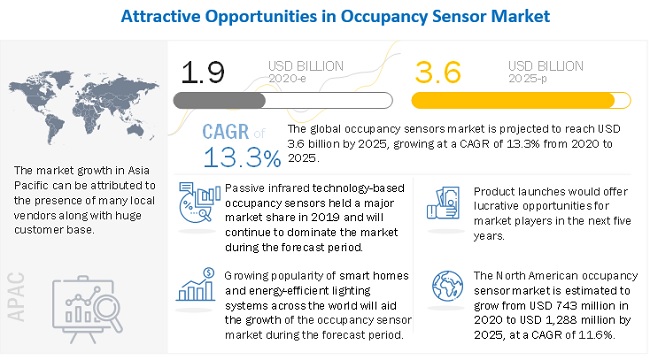The occupancy sensor market is projected to reach USD 3.6 billion by 2025 from USD 2.9 billion in 2020; it is expected to grow at a CAGR of 13.3% during the forecast period. The growth of the occupancy sensor market is driven by factors such as increasing need for energy-efficient lighting controls and the growing popularity of smart homes. On the other hand, the rising trend of green buildings across the world is among the major factors that are likely to create growth opportunities for the market.
The passive infrared-based occupancy sensors accounted for the largest share of occupancy sensor market in 2019. These sensors are affordable and consume lower power than the other two technologies, which makes more it suitable for wireless network connectivity.
Download PDF Brochure:
https://www.marketsandmarkets.com/pdfdownloadNew.asp?id=3859894

The occupancy sensor market for 180–360° coverage area is expected to account for the highest share during the forecast period. There is a strong demand for higher coverage area occupancy sensors as a single occupancy sensor can be installed in large rooms such as large office floors, conference rooms, and classrooms, whereas 89° and 90–179° coverage area-based sensors are used mostly in smaller spaces due to their limited field of view.
The occupancy sensor market for residential building type is expected to grow at the highest CAGR during the forecast period. In the current market scenario, most house owners prefer their residences to be installed with the latest technologies, which also help them manage energy usage and minimize the cost. Moreover, growing awareness regarding home automation and smart homes among occupants are expected to drive the occupancy sensor market for residential buildings.
Request Free Sample Report:
https://www.marketsandmarkets.com/requestsampleNew.asp?id=3859894
North America led the global occupancy sensors market in 2019. The demand for occupancy sensors in North America for commercial and residential buildings is more than other geographies. This demand is attributed to the value chain for the occupancy sensors market being well-organized and well-managed in the region. The US continues to remain the largest market for occupancy sensors across the region. The occupancy sensor market in the US is primarily driven by supportive government plans and the presence of key players in the country, along with their offerings.